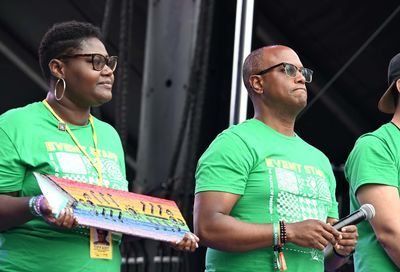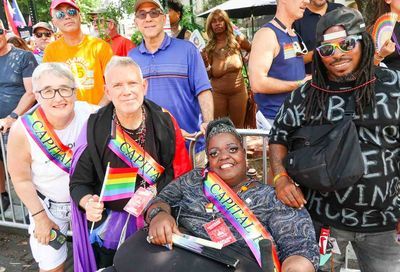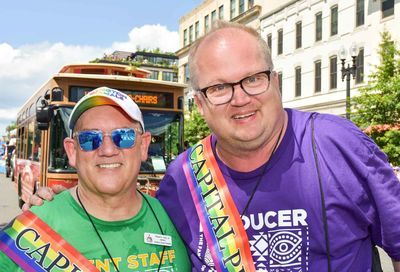Sowing Success
Commentary: Center Field
The authors of the Dallas Principles, a proposed set of core values for achieving LGBT equality, have been criticized for their invitation-only meeting at a Dallas airport hotel in May, but I am not terribly concerned about that. I have seen the endless wrangling that resulted from scrupulously all-inclusive processes to draft the lists of demands for past marches on Washington. They were little more than navel-gazing exercises. My own problem with the Dallas Principles is that they shortchange proven activist methods, substituting an ultimatum.
My colleague Bob Summersgill, architect of the incremental strategy that has brought Washington, D.C., to the brink of civil-marriage equality, faults the Principles’ ”No Delays, No Excuses” message for disrespecting activists around the country who have made gains through persistent and informed engagement with lawmakers and government executives. He points out that the Dallas document’s give-us-everything-right-now tone is at odds with the long, painstaking efforts that are needed to win support from many politicians. Winning equality takes a lot of work, and there are no shortcuts.
Summersgill also strongly criticizes the Fourth Principle, ”Religious beliefs are not a basis upon which to affirm or deny civil rights.” As he notes, rejecting faith as a basis for advocacy ignores the deep religious roots of the civil-rights movement and gratuitously insults a significant portion of the population, gay believers included. It makes no political sense to concede the entire religious sphere to our adversaries. In D.C., the marriage-equality cause was recently aided by more than 100 gay-affirming ministers who issued a joint statement of support.
The one-size-fits-all approach suggested by the Dallas Principles is counterproductive. In many states, the groundwork for marriage equality is far from being sufficiently laid, yet there is much useful work to do there. LGBT voters and their allies would be shooting themselves in the foot if they denied support to a good-but-imperfect candidate when the alternative was worse.
As a member of a nonpartisan advocacy group, I agree with the Fifth Principle, ”The establishment and guardianship of full civil rights is a non-partisan issue.” The fact that Democrats have a much better record of support for our issues doesn’t mean we should be satisfied, especially given that the party increased its majorities in Congress and statehouses by recruiting more conservative candidates. If we want better choices, we have to recruit better candidates from every party — including LGBT candidates. The Gay and Lesbian Victory Fund is one such effort.
The Dallas Principles reflect a wider impatience with politicians. Impatience is a strength if it propels productive action, but not if it leads to a flight from reality. If politicians are unresponsive, we need to redouble our search for ways to reach them — not denigrate activists who take a different approach, as when the epithet ”careerist” was hurled at people who attended the June 29 White House reception marking the 40th anniversary of Stonewall. I can understand criticism of a particular organization or staffer, but not insults against professional activists generally. Our adversaries have well-funded, professional operations, and intramural sniping will not help us compete.
Many in Congress underestimate their constituents, who are ahead of them on ”Don’t Ask, Don’t Tell” and other gay issues. Helping these politicians catch up requires more than threats and boycotts; it requires plenty of individualized attention. Think of it as a marriage that you want to succeed. If you are looking to be unimpressed, you’re bound to succeed; but it would be better to focus on how to replicate our successes.
Frederick Douglass famously said, ”Power concedes nothing without a demand.” I would amend that to say we gain power by asserting it, by summoning it within ourselves rather than viewing it as an external commodity to be obtained from others. When patrons at a gay bar in 1969 decided to stand their ground in the face of yet another police raid, it was an expression of power.
We have come a long way since then. Now we must step up in every city and congressional district and press for policy after policy in the disciplined, concerted way that confident and influential groups do. Every forward step prepares the way for the next. We do not need a loyalty oath or ultimatum. We need more people in more places doing more of the things that got us this far.
Richard J. Rosendall is a writer and activist whose work has appeared on Salon.com and the Independent Gay Forum. He can be reached at .
Support Metro Weekly’s Journalism
These are challenging times for news organizations. And yet it’s crucial we stay active and provide vital resources and information to both our local readers and the world. So won’t you please take a moment and consider supporting Metro Weekly with a membership? For as little as $5 a month, you can help ensure Metro Weekly magazine and MetroWeekly.com remain free, viable resources as we provide the best, most diverse, culturally-resonant LGBTQ coverage in both the D.C. region and around the world. Memberships come with exclusive perks and discounts, your own personal digital delivery of each week’s magazine (and an archive), access to our Member's Lounge when it launches this fall, and exclusive members-only items like Metro Weekly Membership Mugs and Tote Bags! Check out all our membership levels here and please join us today!


























